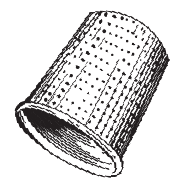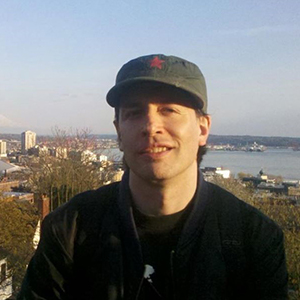The baby crow must have fallen from its nest. With a scraping, tuneless little voice like the hinge on a broken door, it cried. I looked up at the bushy maple where I saw it moments ago. The branches, crowned with leaves, seemed to rejoice in the dynamic sunlight of late July, forming a lush canopy over vehicles parked along the corner where Second Avenue met Blanchard Street. I looked around. But I couldn’t see the little bird. Instead, beside my feet lay discarded soda bottles and cups. Melting ice cubes. Cigarette butts. A disposable white polypropylene face mask.
I heard the little crow cry out again. My wife discovered it in the bed of a filthy black pickup truck parked beneath the maple. I caught my breath as the bird stared back at me with wet blue eyes, trapped between a heap of rags and a toaster oven.
I’ve always longed to touch a crow. To feel its feathers against my fingertips. To stroke its beak. To feel its talons clutching my forearm. Is it human to wish to impose myself on an animal? I know it’s wrong. I understand their instinctive apprehension. It’s an apprehension well-earned by my kind. My father hated crows. I grew up in the sticks with him. And in an effort, he said, to keep packs of marauding crows from the nests of nearby hawks, he blew them from the sky with his shotgun. When they landed in the weeds, he tied their slender carcasses to wooden poles along the back fence of his pasture. There, they swung upside down in the breeze, eventually becoming skeletons, eventually disintegrating.
April is nesting season here. By summer, some baby crows can fly. This one could not. Its feathers were coming in slowly—its tiny body a patchwork of charcoal black and espresso brown, sooty grey and chalky white—scattered bald spots blended with budding plumage that resembled dark felt.
I heard someone ask me what I was doing. It was a man pushing a red rental bicycle up the steep sidewalk behind me. Shirt open, dripping sweat, he leaned the bike against the wall as I tried coaxing the baby crow into my hands. As a cluster of people brushed by him, he said something under his breath. Then he cleared his throat, raising his voice, suggesting I leave the bird alone.
“You don’t wanna mess with those things, man,” he said.
But over the years, I’ve developed a special relationship with crows. I spread birdseed along the top of the tall picket fence outside our old apartment window. Curious crows quickly noticed. So, I began buying bags of unsalted peanuts. Big, bulging bags. Scattering pieces along the sidewalk as I made my way from place to place. My popularity with the crows grew. They followed me everywhere. I fell in love with them.
Today, crows shadow me around the university where I work. When I leave the office for coffee, they float over my head, sometimes gliding close enough that their feathers brush my ear. One crow used to graze the side of my head as it flew past me toward the lower branch of a tree. Its feathers were an elegant mixture of purple and black. I called it Purple. Purple followed me to the stairs overlooking my office, landed on the brick banister, and looked into my eyes like it remembered me from a distant past. In a soft voice, I used to talk to it. In my naivete, it seemed like the bird wanted to trust me. I was often no more than a foot away.
When my wife and I left Seattle for a year while I attended grad school, I was eager to befriend the crows of Orange County, California. Terrified, they flew away if I tossed a peanut in their direction. They were nothing like Seattle crows, and it disappointed me.
Back in Seattle, I imagined that baby crow dying in the bed of that pickup truck, and it broke my heart. Maybe it would fall out onto the highway boiling with cars. It might endure the trip, traumatized and overwhelmed, only to be dismembered by a dog. I leaned as far forward as I could—stretching my arms toward it—attempting to rescue it without climbing into the back of the truck. (I tried to get in; my wife stopped me.) But the bird was not remotely interested in being rescued, especially by me. It took one look at my outstretched hands, parted its tiny beak, and backed away.
Megan loosened a branch from a bush. Standing along the passenger side, she used it to shepherd the bird toward the rear. Leaning over the tailgate, I stretched toward the bird with my long arms. I could almost reach it. Not appreciating this new development, it screeched for its mother. Megan finally closed the gap between the baby and me. It was a few inches away now, looking desperate and sad, blinking, opening its pink mouth to cry. Pausing, looking away, I bent down, quickly gathering the baby crow into my hands. I felt it struggle against me, tiny feet scratching at my palms, wriggling, panicking. Its fragile body like a bundle of twigs wrapped in Kleenex.
There it was—the moment I always wanted to have—I was holding a crow. But all I could think was that I had to get it to safety—away from the truck and imminent tragedy; away from Blanchard Street and the cars racing up and down the hill; away from people sauntering past, even away from me. I had to move quickly. I turned, lifting the tiny bird high over my head. On my tiptoes, I deposited it into a nook in one of the branches. It stared down at me, for once silent.
That was when the strange bystander said the baby’s parents would definitely kill it now. “Because you touched it,” he assured me. I looked at him. He wore a sparse moustache. Pimples. Lank black hair touched his shoulders, wet strands curling at the nape of his neck. He wobbled a little, a sneer stuck to his face, the damp tank top under his open shirt stuck to his chest. He stank of alcohol and sweat.
I resented being called a villain for trying to help a helpless creature. “What would you have done?” I asked him, suddenly angry, turning to face him. “Let it die?” My wife pulled me by the arm across the street and we walked down the hill to where we’d parked. I shouldn’t have engaged the man. And I wished we hadn’t left so abruptly. I was ashamed of myself for letting someone get under my skin, for letting someone spoil a special moment.
Driving home, I was haunted by the thought of that little bird falling out of the tree. I also worried it might die alone up there. After making a forty-minute slog back home in weekend traffic, we turned around and headed back to Blanchard. Arriving, we couldn’t find it. Finally, seeing a motionless clump of feathers high in the maple tree, we were sure it was dead. I wanted to cry. Suddenly the little bird raised its head in excitement, calling out. Another crow—maybe its mother—was nearby.
That’s when I did.


